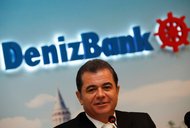Mr. Guriev had taken steps to withdraw his candidacy for the board of Sberbank earlier this week, but bank officials said it was too late to remove his name from the ballot, which made Friday’s announcement all the more dramatic. He received more votes than any other candidate — indeed more than the bank’s chairman.
Though the votes for Mr. Guriev were cast days ago, before the news broke that he had fled, the results leave little doubt that he has the sympathy of a range of powerful figures in the world of finance and government. The bank’s chairman, German Gref, said Mr. Guriev could remain on the board and take part in board meetings by teleconference.
Mr. Guriev’s ideas had helped guide economic policy during the presidency of Dmitri A. Medvedev. After Vladimir V. Putin returned to the post, Mr. Guriev became one of the most prominent people to vocally support opposition causes. Since then, prosecutors have questioned him repeatedly in a conflict-of-interest case centering on a 2011 report he helped write that criticized the prosecution of Mikhail B. Khodorkovsky, a Putin rival and oil tycoon.
Kremlin officials have cast Mr. Guriev’s decision to leave the country as a purely personal one, but many in Moscow saw his flight as part of a new and foreboding phase in the crackdown on political opposition.
The Sherbank vote is “a display of solidarity from what are known as ‘in-system liberals,’” said Yevgeny N. Minchenko, director of the International Institute for Political Expertise in Moscow. Mr. Guriev, he said, is well connected in this circle of powerful technocrats who still dominate in Russia’s economic sphere, corporate world and system of higher education.
For days, Moscow insiders have been debating whether Mr. Guriev had truly been in jeopardy, and on Friday he offered a detailed account in e-mail exchanges of what led to his decision to leave Russia. He said scrutiny from investigators in the court case had mounted over the spring, culminating in a sudden — and, to his mind, alarming — demand that he surrender five years’ worth of professional and personal e-mails and submit to searches of his office and home.
In particular, he was worried that investigators were preparing to name him as a suspect rather than a witness in the conflict-of-interest case. Prosecutors contend that some of the experts who helped write the 2011 report that criticized the prosecution of Mr. Khodorkovsky had received money years earlier from his company, Yukos.
Mr. Guriev feared that the authorities could take away his passport and prevent him from leaving Russia — a serious consideration because his wife and children live in France. He said he also feared that the authorities would press him to serve as a witness in a new prosecution targeting Mr. Khodorkovsky, who is due for release from prison next year.
His informal exchanges with investigators were disturbing, he said — one of them asked if he was considering leaving Russia. In late April, increasingly anxious, he reached out to well-placed friends and concluded that his political protection had diminished.
“Some people told me the risks are acceptable, some advised me not to return, but nobody gave guarantees,” he said.
“I won’t go back even if there is a small chance of losing my freedom,” he said by e-mail. “I have not done anything wrong and do not want to live in fear.” He added that he had “no issues with Putin or Medvedev.”
Moscow’s power elite has been consumed with discussion of the case this week. In pro-government circles, many said Mr. Guriev had over-dramatized the investigation. But most analysts agreed on one thing: Mr. Guriev falls into a category of power brokers who disagree with the Kremlin’s anti-Western course and intense consolidation of power, but who have generally remained quiet about political changes.

Patrick Reevell contributed reporting from Paris.
Article source: http://www.nytimes.com/2013/06/01/world/europe/economist-sergei-guriev-doesnt-plan-return-to-russia-soon.html?partner=rss&emc=rss

